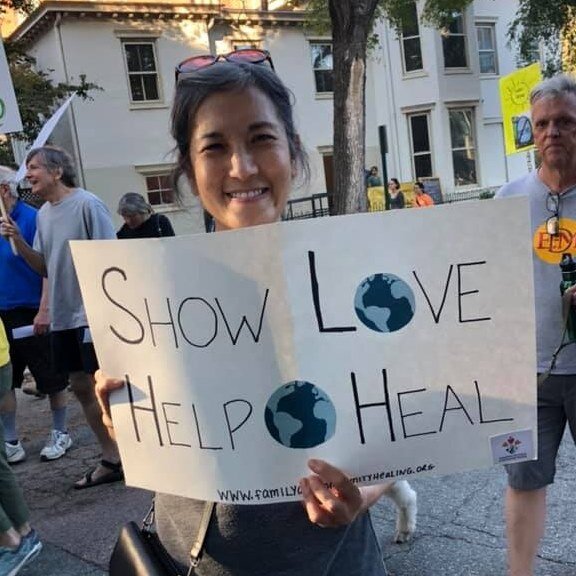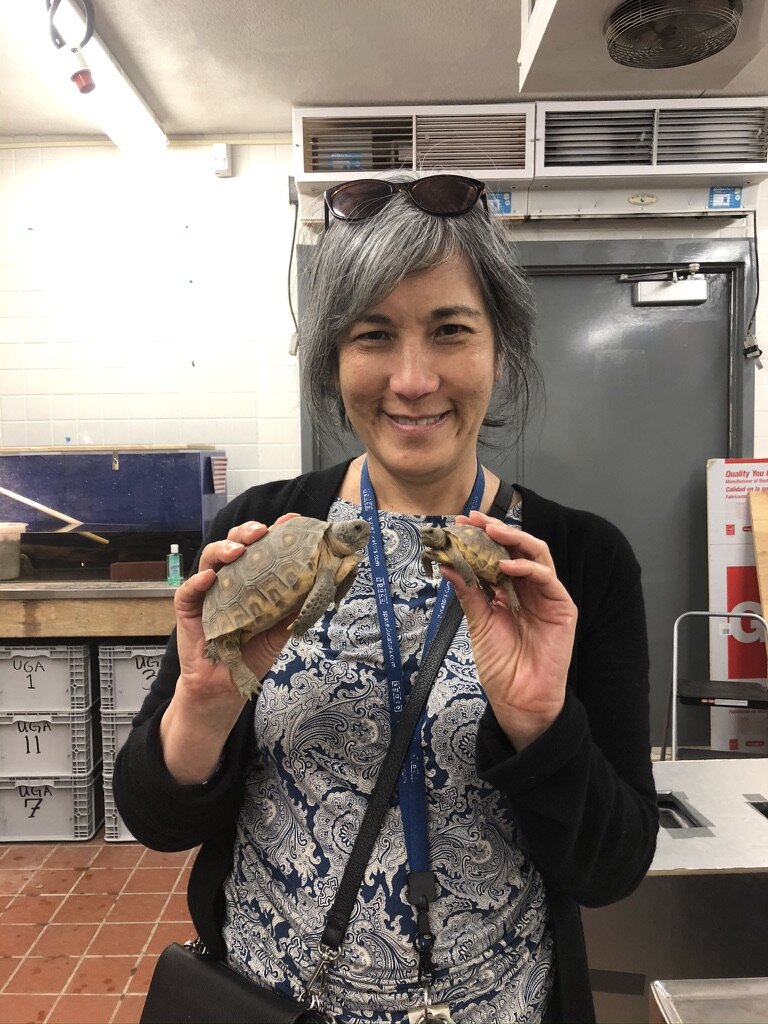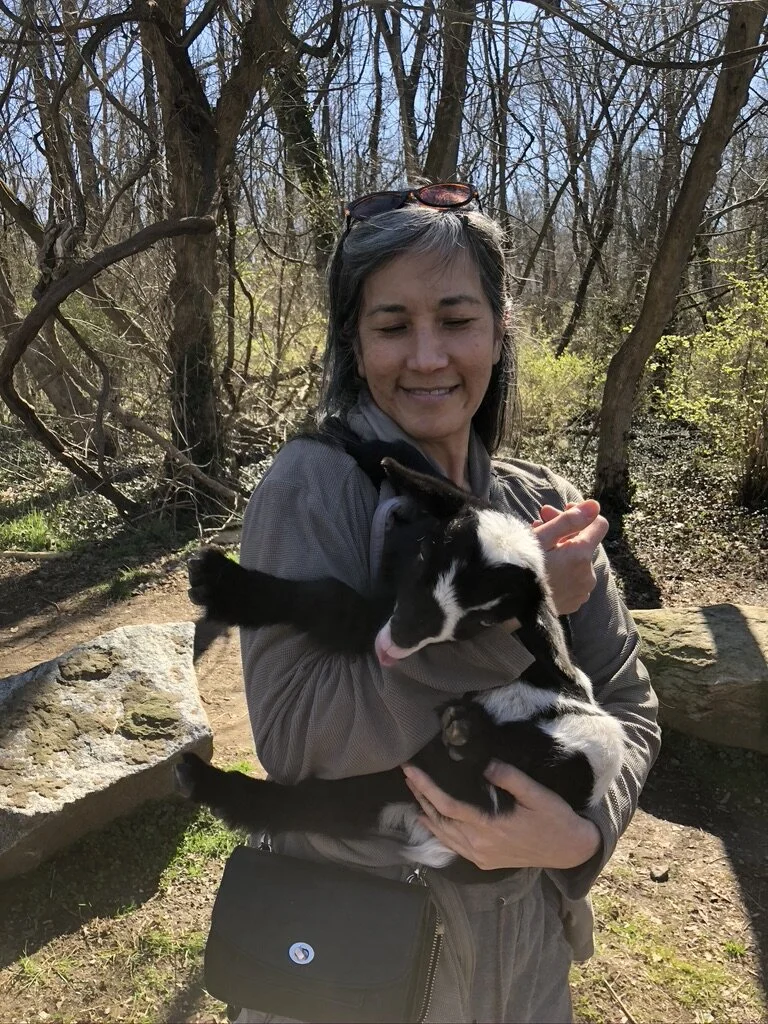
Susanna Calvert: Heaven on Earth
by Charles McGuigan 10.2021
Susanna Wu-Pong Calvert.
Susanna’s house is not far from the mighty James. We sit on her back porch which is surrounded by small groupings of river birch, their lace-like leaves casting a veil of shadows across her face. On the rear end of the property a number of loblolly pines tower above the birch trees, and everywhere there is the ratchetting of cicadas and the trilling of birds. We are bathed in sweet nature and her sounds and smells, her constant and ubiquitous pulse—reminders of the intricate web that connects everything on the thick shell of our biosphere.
Although born in Georgia, Susanna moved at a fairly early age to Poughkeepsie, New York, where her father, a Chinese immigrant, went to work for IBM. Then, during the bicentennial year, the family relocated to Houston, Texas, and for the young Susanna, still in middle school, it was a terrifying cultural shock.
“It was a nightmare,” Susanna says. “I was twelve. It was traumatic. In New York I felt like everyone else, and then suddenly I was like this alien in a strange land. The first year I was there I didn’t say a word through any of my classes. My confidence went underground.”
The same held true even in college when she attended the University of Texas at Austin where she studied pharmacy. “I was like an alien from Mars,” she remembers. "It was that old cliché. ‘Where are you from?’ someone would ask. Literally every week of my life while I was in Texas that would happen. And I would tell them, I was born in Georgia and they would say, ‘Oh, well you speak really good English.’”
That all changed the moment she left the Lone Star State. Susanna did her graduate work at University of California San Francisco where she studied pharmaceutical sciences. “I felt like for the first time I was seen as a person,” she tells me. “In Texas, I was totally invisible to people.”
In 1993 she accepted a faculty position at Virginia Commonwealth University’s School of Pharmacy, and seven years later was granted tenure. “It was everything I thought I ever wanted,” says Susanna. “It fulfilled all the dreams of my Chinese-American parents, and myself. And it was the worst thing that ever happened to me.”
Her two dogs, Kennedy, an Airedale, and Romeo, a Schnoodle, are ramping it up on the porch, under the table and under the chairs, then out to the backyard. Susanna takes them inside, and then returns to the porch.
Even before I ask why receiving tenure was the worst thing that ever happened to her, Susanna says: “Because I thought it would make me happy, and I was absolutely miserable. My life was a wreck and my marriage was a wreck, and my health was in shambles. It wasn’t authentically me. Even though it was meaningful work—and it’s a privilege to be a scientist and a professor—it wasn’t authentically me, and because of that, it was crushing my soul.”
In those days, Susanna bought into a myth so many of us believe about the road to happiness. “A McMansion in the West End,” she says. “A tenured position. Married to a doctor who was half Chinese.” But she had been plodding along on this hamster wheel to the point beyond tedium for far too long. “I was literally in despair,” Susanna says.
That’s when she had a road to Damascus moment. “The dishes were not dry from my tenure party that I threw myself when I decided to take a break from it all,” Susanna says.
Susanna gave up her tenure, but was asked to continue teaching, at least on a part-time basis. But soon enough ennui set in again.
She met with the dean and told him: “I’m bored to death.”
“Well I could use help consolidating our graduate program,” he told her. “Do you want to do that?”
“Sure,” Susanna said.
Susanna with gopher tortoises.
It would prove to be a turning point in her life. “It turns out I loved administration,” she says. “That’s when I became involved in leadership and career development because I really wanted to develop the student as a whole person.” Susanna studied personal and professional development, and worked with the Gracie Harris Leadership Institute at VCU.
“That’s when I had another epiphany,” says Susanna. “This is what I love to do.”
And those around her understood this even before she did. “I was working in the VCU leadership program and I was just having a conversation with one of the participants,” she says. “And she said to me, ‘Oh my God, Susanna, you should do this for a living.’ That had happened ninety-nine times before.”
Through her work, Susanna was helping others to avoid making the same mistakes she had. “I was helping people have the thing that I missed which was to find their best self and their authentic self,” Susanna says.
On about 2010, she had another blinding flash of insight. “Another epiphany,” she says. “I understood this was my calling, and I didn’t even know I was missing a calling.”
So Susanna returned to school, earning a master’s degree in applied positive psychology at the University of Pennsylvania—the birthplace and omphalos of positive psychology.
“Positive psychology is the science of well-being,” Susanna explains. “It’s not the medical side of psychology, which treats mental illness. Positive psychology answers this question: What makes people thrive and have a good life? It’s very much on the other end of the psychology spectrum which I feel we spend way too little time focusing on. Both are very important.”
Armed with this degree, along with coaching credentials and certifications, Susanna began working at VCU again. By then she had divorced her first husband, and remarried Christopher Calvert. Life was good, and then it got even better. “My dream job opened up at the University of Georgia,” she says. “So Christopher and I moved to Athens where I was the inaugural director of programming in their office of faculty affairs. They created this position to support faculty success. My goal was to improve the well-being of the faculty that would make them be successful in their job.”
Things were going along swimmingly, and then about a year and a half after accepting the position in Georgia, Susanna’s sister died. After returning from the funeral, the couple received dreadful news.
“That week we learned about Christopher’s Stage IV Cancer,” Susanna says. She pauses for a long moment, then looks me directly in the eyes. “Christopher actually passed away three years ago to the day,” she said. “I knew right then that my life as I knew it was over, and I knew I had to lean into the post of traumatic growth, this idea that we can grow and thrive after trauma.”
She continued working in Georgia for another year and a half. “And then I received a divine inspiration to quit my dream job and move back to Richmond and start the Foundation for Family and Community Healing,” Susanna says. “I put all my savings into it. This was at the end of 2018, and our mission is to help all of us learn to create healthy and rewarding relationships with ourselves, each other, the earth, and the living force that connects us. So it’s really about our purpose, and connecting to something bigger than ourselves, our feelings of awe and inspiration and wonder and gratitude and forgiveness. All of those things.”
Since the pandemic raised its viral head, humanity has begun to take notice of things that had been staring us in the face all along. “I feel like a lot of us going through COVID are realizing how our lives are worth much more than what we have been bartering it for,” says Susanna. “A paycheck and materialism and these activities that were supposed to make us feel successful and happy, but often leave us feeling that we need more, something bigger and better. We are stepping off the hedonic treadmill. People are starting to look for something more meaningful, not only with their work, but hopefully with each other, with themselves, with the earth.”
As things were stripped to the bare bone, people took note. “All those things we thought we needed, we discovered we really don’t need them,” Susanna says. “Non-essential goods and services are non-essential by definition and we’re looking for something else to replace them. They were preventing us from noticing what we really want in our lives, and that’s my own story, too. I had all these check marks, but they were all external things that somehow I made up or I adopted from somewhere.”
One thing Susanna knows for sure from her study of positive psychology is that human joy and income are correlated, but only to a certain point. “They go up together, but when our basic needs get met, things level off,” she says. “What’s always there for us are nature and each other, and so hopefully we are going through a rediscovery. It seems like a lot of people have returned to nature.”
Susanna hearkens back to those days and nights when she nursed her dying husband. “What I learned when I was caring for Chris was that I wanted to support his medical care and nutritional care and so forth, his physical care and healing and repair,” she says. “And at the same time I wanted to make sure that he was bringing all of his resources to the table, not just the physical. So I’m talking about the emotional, psychological and spiritual so he felt safe and loved and cared.”
The same applies, Susanna believes, to the mother of all mothers, and fathers—the earth herself. “This is where we are with earth,” says Susanna. “We are not bringing all the resources to the table for earth healing. Some of us are attending to the physical end, the regulatory and all of that. And there needs to be more of that. But there is also this other opportunity that I think is maybe a more inviting approach to everybody because there’s disagreement on this other end. Regardless of how you vote, I feel that all of us have a loving relationship with at least some part of earth. Either a geographic location or a body of water or something else—a plant or an animal.”
Susanna with a goat.
She invites me to view the earth as a fellow being. “Everybody needs to start thinking of earth as a loved one who is ailing and that is no different from any other loved one,” says Susanna. “So if your favorite aunt was sick, what would you do? You would go see her, you would be present, you’d put your phone away and all your other devices, you would notice how she’s doing today, and if you thought she needed something you would go fetch it for her. You would tell her how much you love her. You would express your gratitude for the care she has provided to you over the years or the relationship you’ve had with her. You might pray or meditate for her healing. You might sing her a song or do a painting of her in celebration. You would invite others to participate as well. And what does this cost? It doesn’t cost anything. And how much time does it take? It doesn’t necessarily take any time either.”
And it’s simple to address the earth, pretty much anywhere. “It’s not like you have to travel to Nebraska to see earth,” Susanna says. “And even if you live in the city, you have the sky, the birds and the insects, you have the grass, and the land itself is earth. Even the materials by which we build our homes are made from earth. We don’t get them from Mars; they come from Earth.”
This in no way discounts the clamps we have to apply to reduce pollution. “We have to stop the polluters and change the regulations and vote for people who are pro-environment,” says Susanna. “Absolutely, and we need to increase that tenfold in my opinion. I do believe that we are going to impact earth with our activities no matter what we do. I think, and this is just my opinion, that earth can support all of us. What she can’t support is us living this lifestyle of waste and extravagant and excessive materialism. What she cannot withstand is us being careless and unnecessarily destructive in how we just throw things into landfills.”
She considers what is happening worldwide. “Climate change, environmental catastrophe, pandemic, inflation, wildfires, floods,” she says. “I think these are natural consequences. To me this is Mother Earth healing herself, just like our immune system has molecular and cellular responses. I think that’s what’s happening. Earth is just trying to heal herself, which is a natural consequence to our behavior; and if we don’t change our behavior it will keep getting worse and worse until we hit rock bottom and we realize we have nowhere else to go and we have to make a change.”
Though so much of the news concerning the environment is as grim as a scythe-wielding reaper, Susanna has hope. “We are so much bigger than anything we can ever dream of in our scared little minds,” she says. “So whether you think you access the divine from within or the divine from without, it’s the same thing.”
And just as we need the earth, the earth needs us. “What if we all attended to Mother Earth?” Susanna asks. “What if we all just added earth to our prayers every night? Even just putting that intention in our hearts every day, whether you believe in God or not, I think can change things especially if enough of us decide this matters and this is worth doing. I feel when we connect with earth like that it’s also good emotionally, psychologically and spiritually for her, for our mother.”
She looks up into a tree and shuts her eyes to the warming sun that barely breaks through the leaves of a river birch. “I hear it, I feel it, I sense it, I see it,” Susanna Calvert says. “It’s very real, it is palpable. And I feel like when we tap into that then miraculous things can happen. This is our soul’s purpose. I can do that, and eight billion other people can do that as well. So what if we did that together? We would literally be creating heaven on earth.”
Editor’s note: If you’d like to learn more about the Foundation for Family and Community Healing visit https://familyandcommunityhealing.org/



